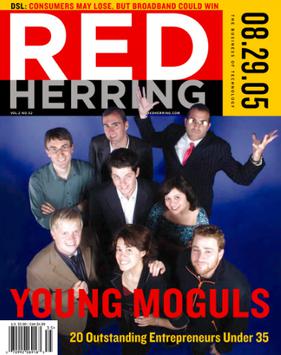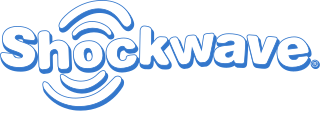Related Research Articles

The dot-com bubble was a stock market bubble that ballooned during the late-1990s and peaked on Friday, March 10, 2000. This period of market growth coincided with the widespread adoption of the World Wide Web and the Internet, resulting in a dispensation of available venture capital and the rapid growth of valuations in new dot-com startups. Between 1995 and its peak in March 2000, investments in the NASDAQ composite stock market index rose by 800%, only to fall 78% from its peak by October 2002, giving up all its gains during the bubble.

Kozmo.com was a venture-capital-funded online company that promised free one-hour delivery of "videos, games, DVDs, music, mags, books, food, basics & more" and Starbucks coffee in several major cities in the United States. It was founded in March 1998 by young investment bankers Joseph Park and Yong Kang in New York City, and was out of business by April 2001. The company is often cited as an example of the dot-com bubble. In January 2013, the brand was bought by Yummy.com and announced that they would relaunch soon. In March 2018, Kozmo was relaunched as a warehouse club. The Kozmo.com website is offline as of July 2023.
TechTV was a 24-hour cable and satellite channel based in San Francisco featuring news and shows about computers, technology, and the Internet. In 2004, it merged with the G4 gaming channel which ultimately dissolved TechTV programming. At the height of its six-year run, TechTV was broadcast in 70 countries, reached 43 million households, and claimed 1.9 million unique visitors monthly to its website. A focus on personality-driven product reviews and technical support made it a cultural hub for technology information worldwide, still existing today online through its former hosts' webcasts, most notably the TWiT Network.
Pets.com was a dot-com enterprise headquartered in San Francisco, U.S, that sold pet supplies to retail customers. The website was launched in November 1998 and was shut down in November 2000. A high-profile marketing campaign gave it a widely recognized public presence, including an appearance in the 1999 Macy's Thanksgiving Day Parade and an advertisement in the 2000 Super Bowl. Its popular sock puppet advertising mascot was interviewed by People magazine and appeared on Good Morning America.

Red Herring is a media company that at different times has published a magazine about tech innovation, an online daily technology news service, and technology newsletters, and has hosted events for technology leaders.

COMDEX was a computer expo trade show held in the Las Vegas Valley of Nevada, United States, each November from 1979 to 2003. It was one of the largest computer trade shows in the world, usually second only to the German CeBIT, and one of the largest trade shows in any industry sector. COMDEX exhibitions were held in many other countries from 1982 to 2005, with 185 shows altogether. The first COMDEX was held in 1979 at the MGM Grand, with 167 exhibitors and 3904 attendees. In 1981, the first COMDEX/Spring was held in New York City.
Verio is a global web hosting provider headquartered in the United States. Incorporated in 1996 in Denver, Colorado, it is a wholly owned subsidiary of Nippon Telegraph and Telephone (NTT) Communications, which acquired the company in 2000. Verio was formed from a consolidation of over 200 smaller Internet service providers (ISPs) and web hosting services.
A business incubator is an organization that helps startup companies and individual entrepreneurs to develop their businesses by providing a fullscale range of services, starting with management training and office space, and ending with venture capital financing. The National Business Incubation Association (NBIA) defines business incubators as a catalyst tool for either regional or national economic development. NBIA categorizes its members' incubators by the following five incubator types: academic institutions; non-profit development corporations; for-profit property development ventures; venture capital firms, and a combination of the above.
Business.com is a digital media company and B2B web destination which offers various performance marketing advertising, including lead generation products on a pay per lead and pay per click basis, directory listings, and display advertising. The site covers business industry news and trends for growth companies and the B2B community to stay up-to-date, and hosted more than 15,000 pieces of content as of November 2014. Business.com operates as a subsidiary of the Purch Group since being acquired in 2016.
StarMedia is a Latin American Internet brand, co-founded in August 1996 by Fernando Espuelas and Jack Chen as the first pan-regional Internet portal for Spanish and Portuguese speaking audiences.
Pixelon was an American dot-com company founded in 1998 that promised better distribution of high-quality video over the Internet. It was based in San Juan Capistrano, California. It gained fame for its extravagant Las Vegas launch party, followed by its sudden and violent decline less than a year later as it became evident it was using technologies that were, in fact, fake or misrepresented. Its founder, "Michael Fenne", was actually David Kim Stanley, a convicted felon involved in stock scams who was "on the lam and living out of the back of his car" when he arrived in California two years earlier. In the year 2000, Pixelon began to fire employees and reduce its operations until its bankruptcy. Pixelon ousted their management team and filed for bankruptcy in June 2000.
The 1999 Webby Awards were held on March 18, 1999, at the Herbst Theater in San Francisco, California. IDG, which still owned the awards organization, continued to retain Tiffany Shlain to produce the awards even though the magazine division she had been working for had been shut down. Mayor Rudy Giuliani had lobbied to move the ceremony to New York City, but San Francisco Mayor Willie Brown interceded with Schlain by promising the city's support, including hosting a post-award party at the newly remodeled City Hall.
Held in San Francisco's Masonic Center for a crowd of 3,000 invited guests, the 2000 Webby Awards were widely considered the peak of the Webby Awards and a watershed of dot-com party culture. The event took place May 11, 2000, shortly before many of the event's perennial nominees and participants suffered business failures in the dot com crash.

Scene7 is an American on-demand rich media software company that provides document hosting and interactive publishing services such as online catalogs, targeted email, video, and image management. Retailers use the company's services to showcase products on their websites and to allow customers to interact with the products. Scene7's technology allows users to manipulate product images by zooming in and rotating products, simulating the inspection of merchandise in retail stores.
Corporate venture capital (CVC) is the investment of corporate funds directly in external startup companies. CVC is defined by the Business Dictionary as the "practice where a large firm takes an equity stake in a small but innovative or specialist firm, to which it may also provide management and marketing expertise; the objective is to gain a specific competitive advantage." Examples of CVCs include GV and Intel Capital.
Stockpoint was a provider of online financial information through its websites InvestorsEdge.com and Stockpoint.com. The company also supplied SaaS capabilities which powered market data features for over 200 other websites such as Barclays Global Investors and Piper Jaffray, the San Francisco Chronicle and Wired News.

Shockwave.com, or Shockwave, is an online and offline video games distributor and game portal. It is owned by Shockwave LLC, based in Los Angeles, California, United States. It was launched by Macromedia on August 2, 1999, to promote the company's Shockwave and Flash players, both used on the website. As of 2005, the website had 22 million users. By 2010, it hosted more than 400 games in a variety of genres.
The 6th Annual Webby Awards was held on June 21, 2002, at San Francisco's Legion of Honor auditorium. It was presented by the International Academy of Digital Arts and Sciences and was hosted by Tiffany Shlain, the Webby Awards' founder, and Maya Draisin. Coming on the heels of the dot-com bubble, a 2002 Internet bubble forced cutbacks in the event budget for this ceremony as well.
Forcepoint is an American multinational corporation software company headquartered in Austin, Texas, that develops computer security software and data protection, cloud access security broker, firewall and cross-domain solutions.
References
- 1 2 Dan Fost (May 13, 2004). "Party's gone, but the Webby awards go on:Winners of best Internet sites receive e-mail notification". San Francisco Chronicle. Retrieved January 8, 2008.
- 1 2 Betsy Schiffma (November 29, 2000). "Party Scene Fizzles With The Internet". Forbes.
- 1 2 3 P.J. HuffStutter (December 25, 2000). "Dot-Com Parties Dry Up". Los Angeles Times .
- 1 2 3 4 5 6 7 8 9 Damien Cave (April 25, 2000). "Dot-com party madness". Salon.com.
- ↑ Leander Kahney (November 9, 2000). "On Crashing Parties at Comdex". Wired .
- ↑ Chris Taylor (February 28, 2000). "On the Dotcom Beat". Time . Archived from the original on November 22, 2010.
- ↑ Sam Whiting (March 7, 2001). "Think Pink Slip: Layoff parties to come to Silicon Valley". San Francisco Chronicle.
- ↑ Stefanie Olson. "Dot-commers going from laid off to lounge lizard". CNET.
- ↑ Miller, Claire Cain (August 21, 2011). "Silicon Valley, the Night Is Still Young". The New York Times .